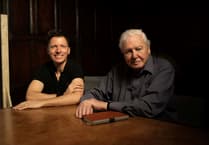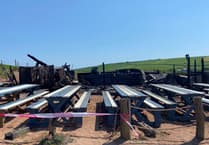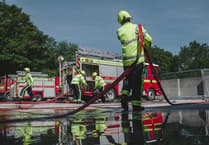AN 89-year-old Royal Navy war veteran has finally been honoured for his service in the infamous Arctic convoys by the Russian government.
Wilfred Ronald Holmes, known as Ron, received the Ushakov Medal from counsellor of the Russian Embassy, Sergey Nalobin, at a special ceremony at County Hall in Exeter.
The medal was awarded to sailors who displayed courage in the course of defending Russia and its interests.
Mr Holmes, who was born in Ugborough, volunteered to join the navy at 17. He made a number of separate trips to northern Russia on board the destroyer HMS Onslaught.
During the convoys they sailed through blinding snow storms and darkness under a barrage of attack from German U-boats and fighter planes to deliver vital supplies to the Soviet Union.
More than 3,000 men died during the maritime campaign that Winston Churchill was said to have called the 'worst journey in the world'.
By May 1945, the Arctic route had claimed 104 merchant and 16 military vessels.
More than 70 years on from the convoys, Ron has finally been recognised for his bravery. In 2013 he received a British medal – the Arctic Star – for his part in the campaigns.
However, the UK Foreign Office did not allow Russia to honour the veterans, saying that it would break rules that do not allow British soldiers to receive a foreign medal more than five years after an action.
But following a concerted campaign in 2013, the Foreign Office allowed an exception to the rule and Russian president Vladimir Putin presented the first medals during his visit to London in June 2013.
Ron, who now lives at The Manor care home in Yealmpton, said he had always wanted to be involved with the navy.
'We were deployed to Murmansk and the Kola Inlet several times,' he related. 'I actually volunteered for the navy. I didn't mind where I went, I just always fancied the water.
'I remember it being very cold, but I didn't mind that. I don't like it too hot, you see, and I still don't.
'I was on board the destroyer HMS Onslaught and we were there to protect the convoys more than anything.
'I wasn't too worried – I think there were too many of us for the Germans to do anything.
'If you had a good crew – and I did – then you were alright. We all had to work together.
'We were there a long time. I actually enjoyed it – but I had to because I volunteered.
'It's nice to be recognised. The medals are quite nice, I keep them next to me.
'I was a stoker down in the centre of the ship. People always think that was just putting coal into a fire, but it wasn't – nowadays they call them mechanical engineers.
'I'm glad to be able to say I've served my country.'




.jpeg?width=209&height=140&crop=209:145,smart&quality=75)
Comments
This article has no comments yet. Be the first to leave a comment.